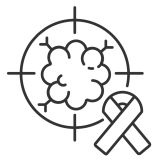In this article:
What is an Oncology and Cancer Biology Degree?
An oncology and cancer biology degree focuses on understanding cancer, including how it develops, spreads, and can be treated. Students learn about the biology of cancer cells, genetics, and the ways cancer affects the body. The program also covers different treatment methods, such as chemotherapy, radiation, immunotherapy, and targeted drug treatments.
This degree provides students with hands-on experience in laboratory research, where they study cancer cells, test new treatments, and analyze data. Many programs also include courses in epidemiology, which helps students understand cancer risk factors and prevention strategies. Some programs may offer clinical training, giving students insight into how cancer is diagnosed and treated in hospitals.
Program Options
For a degree in oncology and cancer biology, there are several educational pathways depending on the level of specialization and career goals. Here are the common program options:
- Bachelor’s Degree in Biology or Biomedical Sciences with a Focus on Oncology: This undergraduate program provides foundational knowledge in biology and introduces cancer biology as a specialization. Students learn about cancer mechanisms, treatment strategies, and basic research methods.
- Master’s Degree in Oncology or Cancer Biology: This graduate program offers advanced coursework in cancer biology, tumor immunology, and cancer genetics. It typically includes research opportunities, allowing students to work on cancer-related projects and gain practical experience in the field.
- Doctor of Philosophy (Ph.D.) in Cancer Biology: A Ph.D. program focuses on in-depth research in cancer biology. Students conduct original research, contribute to the understanding of cancer mechanisms, and often work in laboratories associated with universities, research institutions, or medical centers.
- Doctor of Medicine (M.D.) with a Specialization in Oncology: For those interested in clinical practice, an M.D. program followed by residency and fellowship training in oncology prepares graduates to diagnose and treat cancer patients. This pathway includes extensive clinical training and hands-on patient care.
- Combined M.D./Ph.D. Program: This program combines medical training with advanced research in cancer biology, preparing graduates to work as physician-scientists who can both treat patients and conduct cancer research.
- Master’s or Doctorate in Clinical Research with a Focus on Oncology: These programs prepare graduates to design and conduct clinical trials, evaluate cancer treatments, and contribute to the development of new therapeutic approaches.
Skills You’ll Learn
In an oncology and cancer biology degree program, students develop a range of specialized skills essential for understanding and combating cancer. Here are some key skills learned:
- Cancer Mechanisms: Gain knowledge of how cancer cells develop, grow, and spread, including the molecular and genetic changes that drive tumor formation. Understand various types of cancer and their unique biological behaviors.
- Laboratory Techniques: Learn advanced lab techniques such as cell culture, molecular cloning, and PCR (polymerase chain reaction) to study cancer cells and analyze genetic material. Develop proficiency in using equipment like microscopes and flow cytometers.
- Data Analysis: Acquire skills in analyzing complex data from experiments and clinical trials. Use statistical methods and bioinformatics tools to interpret results and draw meaningful conclusions about cancer research and treatment efficacy.
- Research Methods: Develop expertise in designing and conducting scientific research, including formulating hypotheses, designing experiments, and assessing results. Gain experience in writing research papers and presenting findings.
- Cancer Treatment Strategies: Understand current treatment options for cancer, including chemotherapy, radiation therapy, targeted therapies, and immunotherapies. Learn about emerging treatments and how they are evaluated in clinical settings.
- Clinical Skills: For those in medical or clinical programs, gain skills in diagnosing and treating cancer patients, including patient assessment, treatment planning, and monitoring treatment responses.
- Ethical and Regulatory Knowledge: Learn about ethical issues in cancer research and treatment, including patient consent and data privacy. Understand regulatory requirements for conducting research and clinical trials.
- Interdisciplinary Collaboration: Develop the ability to work with other healthcare professionals, researchers, and industry experts to advance cancer research and improve patient care.
What Can You Do with an Oncology and Cancer Biology Degree?
With a degree in oncology and cancer biology, you can pursue careers in research, healthcare, and industry. These roles contribute to cancer treatment, prevention, and scientific advancements.
- Biomedical Scientist: Study cancer at the cellular and molecular levels to help develop new drugs and therapies. Work in laboratories to analyze disease mechanisms and test potential treatments.
- Biotechnologist: Develop cancer diagnostics and therapies by applying biological research in biotechnology firms. Use scientific innovations to improve cancer detection and treatment.
- Clinical Research Coordinator: Oversee clinical trials for cancer treatments, ensuring they follow regulatory guidelines. Work with researchers to collect and analyze patient data.
- Genetic Counselor: Guide patients and families through genetic testing and cancer risk assessments. Requires specialized training and certification in genetic counseling.
- Regulatory Affairs Manager: Ensure new cancer treatments meet legal and safety regulations before reaching the market. Manage compliance processes and liaise with government agencies.
- Oncologist: Diagnose and treat cancer patients using advanced medical therapies and research-based treatment plans. Requires medical school, residency, and fellowship training in oncology.
- Pharmaceutical Scientist: Develop and test new cancer drugs to improve treatment options. Work in pharmaceutical companies to bring innovative therapies from research to clinical application.
- Pharmaceutical Sales Representative (Oncology Focus): Educate healthcare providers about the latest cancer medications and treatments. Serve as a link between pharmaceutical companies and medical professionals.
- Health Educator (Cancer Prevention & Awareness): Promote cancer prevention, early detection, and healthy lifestyle choices within communities. Work with healthcare organizations to improve public awareness.
- Professor / Researcher: Teach oncology and cancer biology at universities while conducting research in the field. Requires a Ph.D. and a strong academic background in cancer studies.

